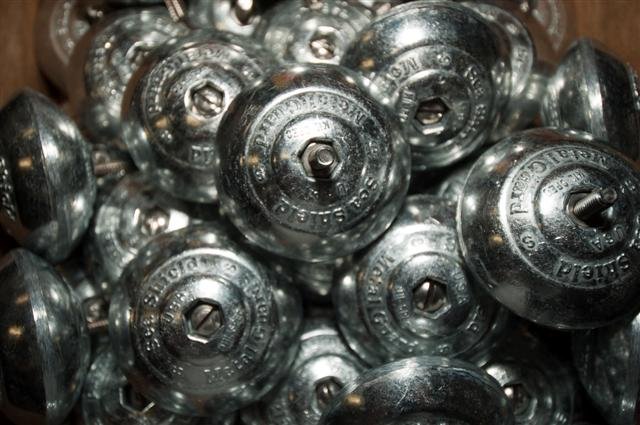Why Boats Need Anodes(zincs).
Boat anodes, often underestimated yet indispensable, are your vessel’s shield against a relentless enemy: corrosion. For boat owners, understanding why boats need anodes is paramount to preserving their investment.
In the harsh marine environment, where saltwater and metal meet, corrosion is an ever-present threat. Without proper protection, the metal components of your boat, such as the hull, propellers, and rudders, are vulnerable to degradation. This degradation not only affects your boat’s appearance but can compromise its structural integrity and safety.
Here’s the deal: Anodes are the first line of defense. They sacrificially corrode instead of your boat’s vital components. These sacrificial heroes extend the life of your vessel, save you money in repairs, and ensure your peace of mind while out on the water.
Now, let’s delve deeper into the specifics of how anodes accomplish this feat and why they are a must for any boat owner worth their salt.
The Different Types of Metals on a Boat’s Hull That Need Protecting.
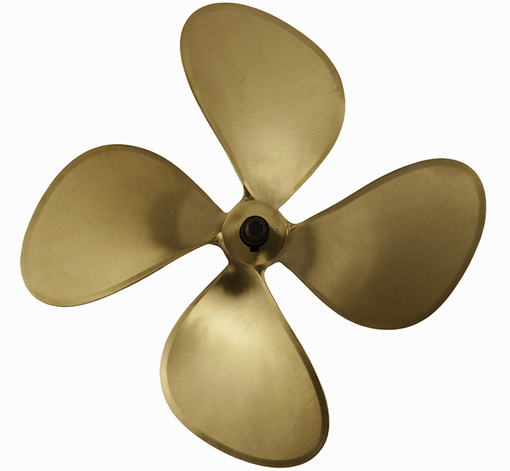
Your boat’s hull is a complex interplay of various metals, each with its own unique characteristics and vulnerabilities that demand protection. Let’s unravel the mystery of the metals that require safeguarding and why they need it.
First on our list are the aluminum components, often found in boat hulls and structures. Aluminum is lightweight and corrosion-resistant to some extent, but it’s by no means invincible in the harsh marine environment. Without proper protection, it can still fall victim to the relentless forces of corrosion.
Next up is steel or iron, commonly used in many boat constructions. While robust and durable, these metals are particularly susceptible to corrosion. Rust on a boat’s hull not only affects its aesthetics but can weaken its structural integrity.
And let’s not forget about the bronze or brass fittings, which add a touch of elegance to your vessel. Despite their timeless beauty, these metals are not immune to corrosion either. Over time, they can deteriorate if not adequately shielded.
So, whether your boat boasts aluminum, steel, or bronze components, one thing is clear: they all need protection from the corrosive powers of the sea. Anodes step up to the plate as the guardians of these precious metals, ensuring your boat remains seaworthy and looking its best.
The Different Types of Metal Anodes.
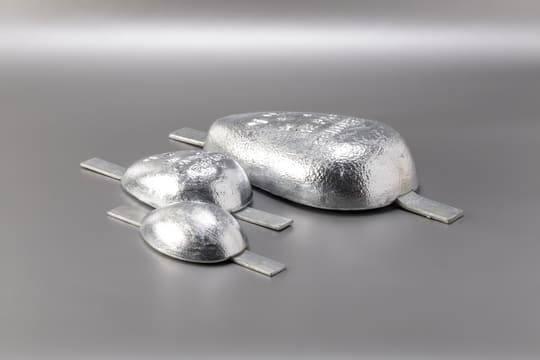
anodes come in various metals, each tailored to specific conditions and needs. Let’s take a closer look at the different types of metal anodes that play a pivotal role in protecting your boat from corrosion.
- Zinc Anodes: These are the workhorses of the marine world. Zinc anodes are highly effective in saltwater environments, where corrosion is most aggressive. They sacrificially corrode to shield your boat’s vulnerable components. Zinc’s versatility makes it a popular choice for many boat owners.
- Aluminum Anodes: Ideal for boats in brackish or freshwater environments, aluminum anodes provide reliable protection. They are lightweight and work well in less aggressive conditions. Aluminum anodes are often chosen for their compatibility with certain boat materials.
- Magnesium Anodes: If your boat frequents freshwater or low-salinity areas, magnesium anodes are the go-to choice. They offer excellent protection against corrosion in such environments. However, they’re not suitable for saltwater use, as they corrode too quickly.
- Mixed-Metal Anodes: Some anodes combine zinc, aluminum, and other materials to provide comprehensive protection across varying conditions. These mixed-metal anodes offer versatility and can be a smart choice for boats that traverse different water types.
An interesting tidbit: Did you know that the concept of sacrificial anodes was first introduced in the early 19th century to combat corrosion in the maritime industry? It’s a testament to the enduring effectiveness of this technology.
Choosing the right type of anode for your boat largely depends on your vessel’s environment and materials. Now that we’ve covered the different types of anodes, let’s move on to Section 4 and discuss the maintenance aspect, including how often anodes need replacement and what influences this timeline.
How often should anodes be replaced?
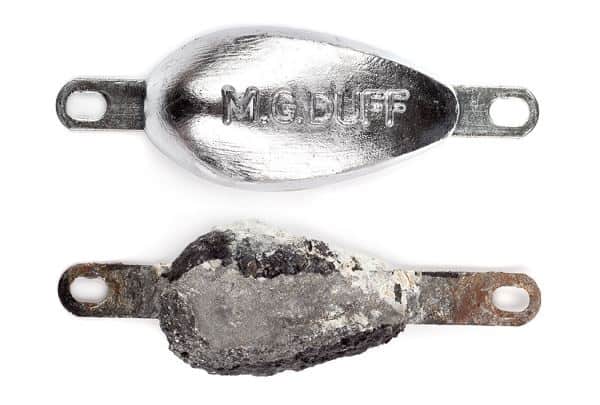
Anodes are like the silent guardians of your boat, but even these heroes need some attention to continue their protective role effectively. In this section, we’ll discuss how often anodes need replacement and the factors that influence this crucial timeline.
How Often Do Anodes Need Replacement?
The frequency of anode replacement varies depending on several key factors:
- Water Type: The type of water your boat frequents plays a significant role. In saltwater, anodes tend to erode faster due to the aggressive corrosive nature of salt. Freshwater or brackish water environments are gentler on anodes and may extend their lifespan.
- Boat Usage: How often and how intensively you use your boat also matters. Frequent outings and high-speed operations can accelerate anode consumption. Seasonal and occasional boaters might enjoy longer-lasting anodes.
- Anode Size: The size and quantity of anodes installed on your boat influence their longevity. Larger anodes generally last longer because they have more sacrificial material to offer.
- Anode Placement: Proper placement of anodes is critical. Ensure that they are correctly positioned on the boat’s hull, propellers, and other metal components to maximize their effectiveness.
Inspecting Anode Condition
Regular inspection is essential to gauge the state of your anodes. Look for signs of erosion or pitting on the anode’s surface. If an anode has eroded by around 50%, it’s time for a replacement. However, don’t wait until they’re completely consumed, as they lose their protective capability before disappearing entirely.
By keeping a vigilant eye on your anodes and considering the factors mentioned above, you can determine when it’s time for replacement. Proactive anode maintenance ensures your boat remains corrosion-free, protecting your investment and maintaining your peace of mind.
Now that we’ve covered anode maintenance, let’s proceed to Section 5, where we’ll discuss the potential dangers of neglecting anodes and the consequences boat owners may face without proper protection.
Potential Dangers of Not Replacing Anodes on Time.
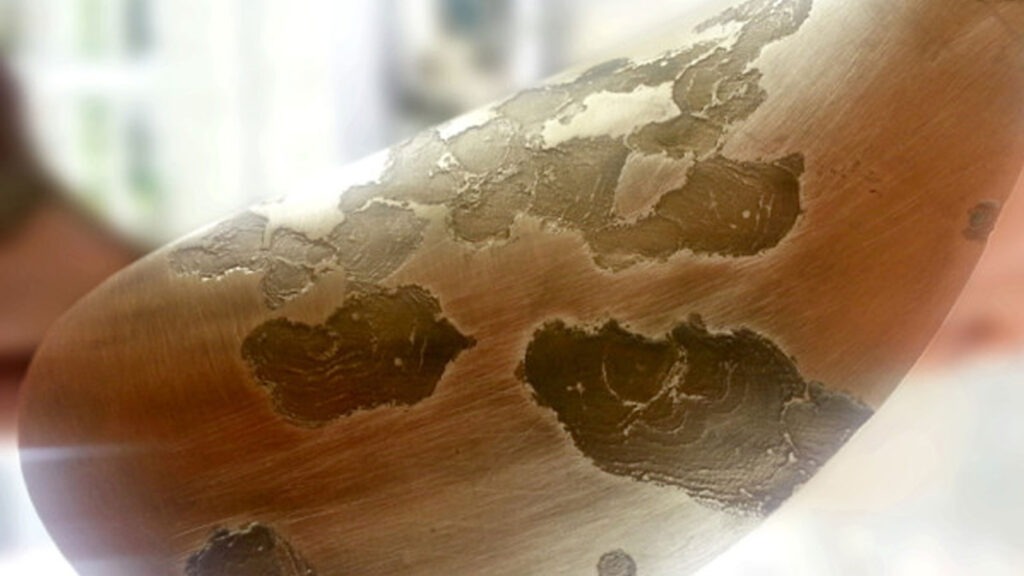
Neglecting anodes on your boat can lead to a series of costly and potentially hazardous consequences. In this section, we’ll explore the risks boat owners face when they overlook the importance of anode maintenance.
1. Corrosion Damage: The most immediate and visible danger of not using anodes is corrosion. Corrosion can weaken your boat’s structure, compromise its integrity, and lead to costly repairs. It’s not just an aesthetic concern; it’s a safety issue.
2. Reduced Lifespan: Anodes are your boat’s best defense against the corrosive forces of the sea. Without them, the lifespan of critical components like the hull, propellers, and engine parts can be significantly shortened. Replacing these components is not only expensive but can also be time-consuming.
3. Reduced Resale Value: If you ever plan to sell your boat, neglecting anode maintenance can hurt its resale value. Potential buyers are likely to be wary of a vessel with a history of corrosion problems, leading to lower offers or difficulty in finding a buyer.
4. Safety Risks: The structural integrity of your boat is directly related to its safety. Corroded parts, especially in vital areas like the hull or steering components, can lead to accidents or breakdowns at sea. Anodes act as a safety net, preventing such catastrophes.
5. Environmental Impact: Neglecting anodes not only affects your boat but also the environment. Leaching of metal ions from corroding boat parts can harm aquatic ecosystems, leading to ecological consequences that can be legally and morally problematic.
Sailing On.
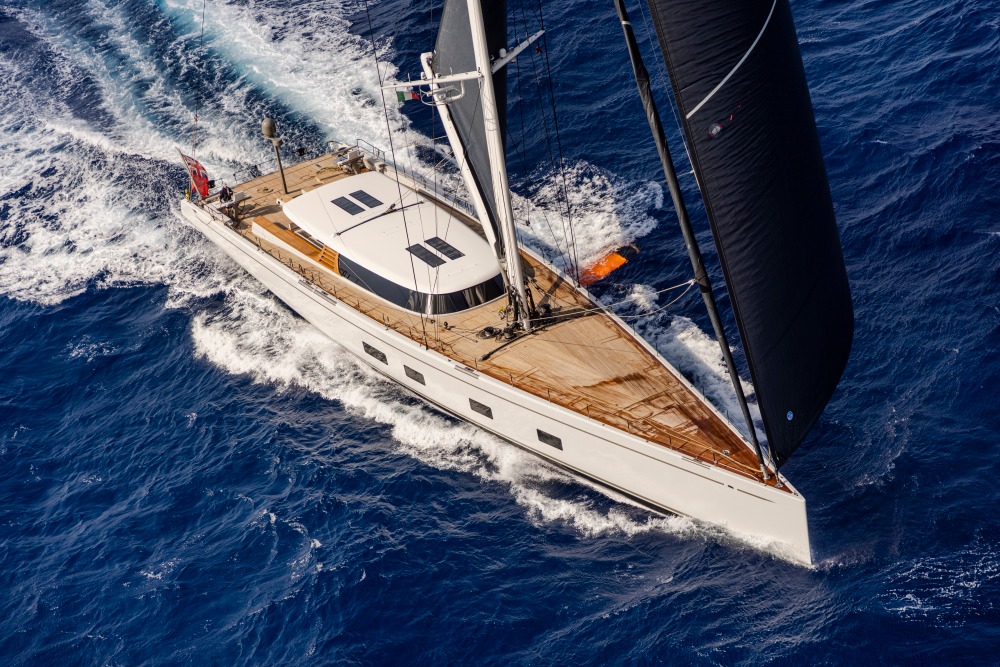
The potential dangers of not using anodes extend beyond mere financial costs. They encompass safety risks, environmental concerns, and a reduced overall enjoyment of your boating experience. Proper anode maintenance is not just an option; it’s a responsible choice that ensures the longevity, safety, and environmental stewardship of your beloved boat.
Now that we’ve explored the risks, let’s wrap up this article by summarizing the key takeaways and emphasizing the importance of prioritizing anode maintenance for all boat owners.
In the world of boating, where the call of the sea beckons and the allure of adventure awaits, there exists a silent yet formidable adversary: corrosion. However, as we’ve explored in this article, the unsung heroes of boat maintenance, anodes, stand ready to shield your vessel from the relentless forces of nature.
Understanding why boats need anodes is not just a matter of preservation; it’s a testament to the love and care we invest in our maritime adventures. Anodes protect your boat’s structure, enhance its longevity, and ensure your safety on the water. They safeguard your investment, both in terms of financial value and cherished memories.
From the different metals that adorn your boat’s hull to the array of anode options available, the choice is yours. Anodes are not one-size-fits-all; they are tailored to your boat’s unique needs and the environment it navigates.
Don’t underestimate the importance of anode maintenance. Regular inspections and timely replacements can save you from the perils of corrosion, extend your boat’s life, and protect the marine ecosystem we all hold dear.
So, whether you’re a seasoned sailor or a newcomer to the world of boating, take heed. Embrace the role of anodes as your stalwart guardians on the open water. Prioritize their care, and in return, they will ensure your boating adventures remain smooth, safe, and enjoyable for years to come.
Remember, in the ever-changing tides of the sea, it’s the unwavering protection of your anodes that keeps your maritime dreams afloat.
Secure Your Boat’s Future Today!
At Pacific Yacht Service, we’re committed to ensuring your boating adventures remain worry-free. That’s why, for new customers, we’re excited to offer a limited-time promotion: FREE Zinc Anode Installations for the First Year.
Don’t miss out on this opportunity to protect your boat, extend its lifespan, and enjoy the open water with peace of mind. Simply give us a call at 714-660-0809 to schedule your installation or learn more about our comprehensive yacht maintenance services.
Make the smart choice today and join the ranks of satisfied boat owners who trust Pacific Yacht.

